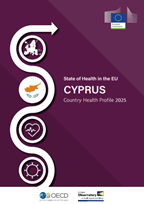HSPM
Health Systems and Policy Monitor

Cyprus introduced a comprehensive General Healthcare System (Geniko Systima Ygeias, GeSY) in June 2019, which now provides universal coverage and free access to all beneficiaries. Under the old health system, Cypriot residents could access publicly provided health services but only around three quarters of the population were technically considered to be covered free of charge.
The main actors in the new system are the Health Insurance Organization (HIO), which is responsible for the administration and financial operation of the GeSY, the State Health Services Organisation (SHSO) tasked with the management, control, supervision and development of public hospitals and health centres, and the Ministry of Health which has a more strategic role and overall oversight of the health system.
The health system in Cyprus was for many decades divided between a centrally controlled public sector that was financed by taxes, and an unregulated private sector that was financed via out-of-pocket (OOP) payments and to a lesser extent private health insurance schemes. The new health care system is a mixture of a National Health Service and a Social Health Insurance scheme, funded by beneficiaries’ and employers’ contributions and the state budget. Revenues are collected and transferred to the Health Insurance Fund (HIF) and managed by the HIO, the sole purchaser of health care services for all beneficiaries through contracted public providers (health centres and public hospitals) and private providers.
Prior to the implementation of the new General Healthcare System, there was no gatekeeping by primary care doctors or a formal referral system to direct patients from primary care to specialist care. Under the GeSY, personal doctors are now the patient's first point of contact with health services and have a gatekeeping role, with access to specialists only possible via referral. Patients can now choose personal doctors from both the public and private sectors. The introduction of the personal doctor is significant as it facilitates beneficiaries' access to their own doctor, and has substantially reduced waiting lists and the need for patients to identify health services and specialists.
Subscribe to our newsletter
Sign Up